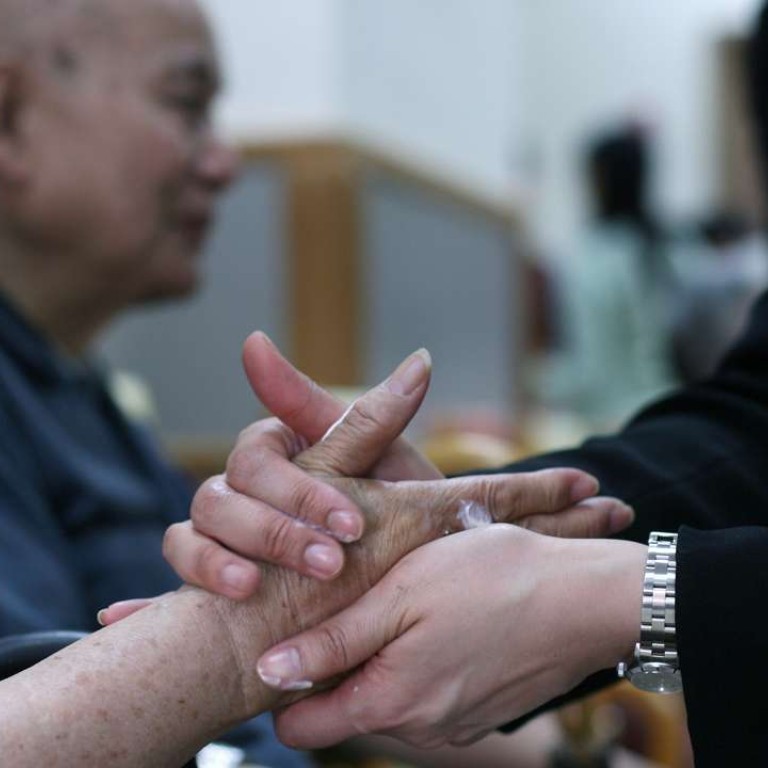
The logic behind universal pensions
How a vibrant economy and robust society can provide true compassion for both the elderly and the elderly poor.
There is popular pressure on government to adopt a social pensions scheme, but public opinion is divided over whether this should be universal or targeted at those without means.
A key issue is affordability as Hong Kong’s population continues to age and its labour force decline in size.
The elderly population as a percentage of the working age population will rise from just over 23.4 per cent now to 60.9 per cent around 2061.
The size of the working age population will decline from 5.0 million today to less than 4.3 million by 2061. Both trends will continue to the end of the century.
Hong Kong’s adverse demographic structure is one of the most serious in the world. It is as bad as Japan’s and will last even longer.
Consequently, introducing a universal social pensions scheme would have a profound impact on the future of Hong Kong’s economic and social system.
The debate cannot be merely about whether society should be compassionate about its elderly or elderly poor. A great deal more is at stake.
A central problem in the debate is that universal pensions have become confused with retirement support.
The purpose of universal pensions originally was to provide insurance for those who lived an unexpectedly long life beyond what they could save for. This was the logic behind its introduction in the United Kingdom in 1925, when the average life expectancy was 56 years for men and 60 years for women.
It was also the logic behind Hong Kong’s Old Age Allowance or “fruit money”, introduced in 1973 as a universal payment to all those above the age of 70. The life expectancy at the time was 69.6 years for men and 76.4 years for women.
As life expectancy continues to rise, as it most likely will, socialised retirement support will transform Hong Kong into an increasingly social welfare state.
Retirement support, on the other hand, raises questions about whether the individual or family should be responsible, especially when people may live 30 or 40 years after retiring from the workforce.
If society decides the state should provide retirement support, then by implication it chooses big government. As life expectancy continues to rise, as it most likely will, socialised retirement support will transform Hong Kong into an increasingly social welfare state.
The problem is not difficult to fix. All one has to do is delay the age of pension payment. Unfortunately, politicians everywhere shirk from telling people the truth: you have to work for more years. There is no shortage of demagogues who will tell lies and promise people what is undeliverable.

If payments are tied to retirement, then why should one work a single day more when someone else foots the bill for leisure and pleasure? Incentives are a big influence on human behaviour.
A lesson from this can be learned from the decision by the last British Governor in the early 1990s to roll out what became extremely generous social welfare benefits.
Per capita government social welfare expenditures increased in real dollars from about $2,000 in 1991 to $7,000 in 2011 (equivalent to an annualised real growth rate of 6.5 per cent). At the same time, the percentage of the population that was not in the labour forced for no compelling reason rose from below 1.0 per cent in 1991 to above 3.5 per cent in 2011.
Incentives have powerful effects on human behaviour. It is why ultimately societies cannot afford universal social pensions.
If public rental housing units were sold to the sitting tenant, this would in one fell swoop provide a valuable asset for the elderly to safeguard their remaining years.
Criticisms of universal social pensions do not come from heartless or vicious intentions. There are better solutions to address the plight of the elderly poor.
In 2011, 48.3 per cent of households headed by an elderly person above 65 years old lived in public rental housing (against 27.4 per cent headed by 20-65 year olds).
If public rental housing units were sold to the sitting tenant, this would in one fell swoop provide a valuable asset for the elderly to safeguard their remaining years. It would also provide more incentive for children to take care of their elderly parents, as they would one day inherit their parents’ property.
This would avoid putting extra pressure on public expenditure and would bring in resources to fund future government housing supply. It would also free up resources to provide much needed funding for future medical expenditure growth due to the ageing population.
Such an approach would keep government small and avoid socialising too much responsibility. It would preserve the essential freedoms and incentives for a vibrant economy and a robust society. And it would provide true compassion for both the elderly and the elderly poor rather than succumbing to the politics of irresponsibility.
Richard Wong Yue-chim is the Philip Wong Kennedy Wong Professor in Political Economy, at the University of Hong Kong

